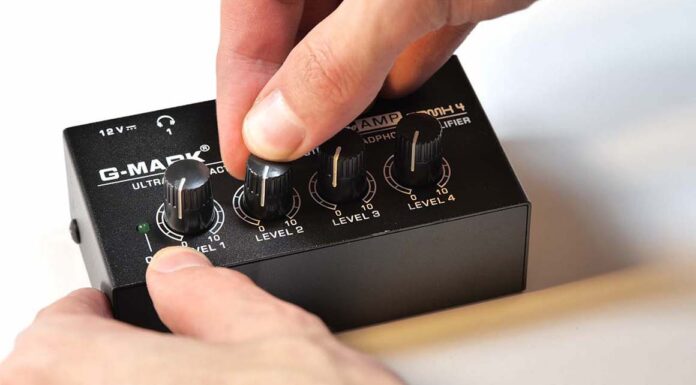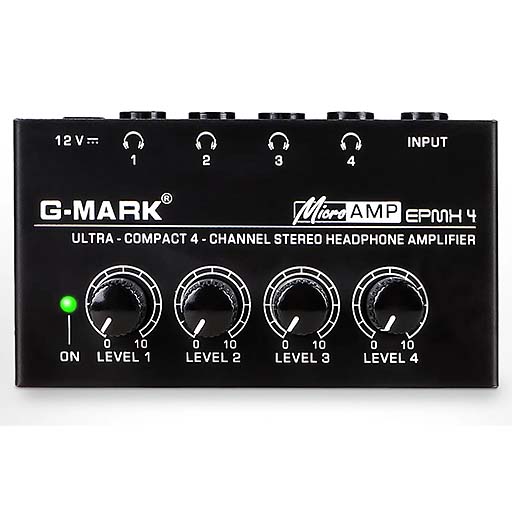While I was buying the G-MARK EPMH4 on Aliexpress, I was wondering if there really could possibly exist a reasonable alternative to the Behringer HA400 headphone splitter amp which was both cheap and of satisfying quality. Well, now after testing the device out, I finally got my answer!
Why you can trust us: We test all of our products according to the techtactician consumer usability benchmark methodology which evaluates all of the product characteristics that matter to the user in day to day use. Enjoy the review!
This web portal is reader-supported, and is a part of the Amazon Services LLC Associates Program, AliExpress Partner Program, and the eBay Partner Network. When you buy using links on our site, we may earn an affiliate commission!
G-MARK EPMH4 – Quick Summary
- Looks and works exactly the same as the Behringer HA400.
- The sound quality is indistinguishable from the original.
- Supports stereo in/out and works flawlessly with audio adapters.
- The sturdy metal casing makes it feel like a premium product.
- Comes with a compatible power supply.
- The knobs are tight, but they do wobble a bit.
- There is no easy way of disabling the green LED power indicator.
First, The General Specs
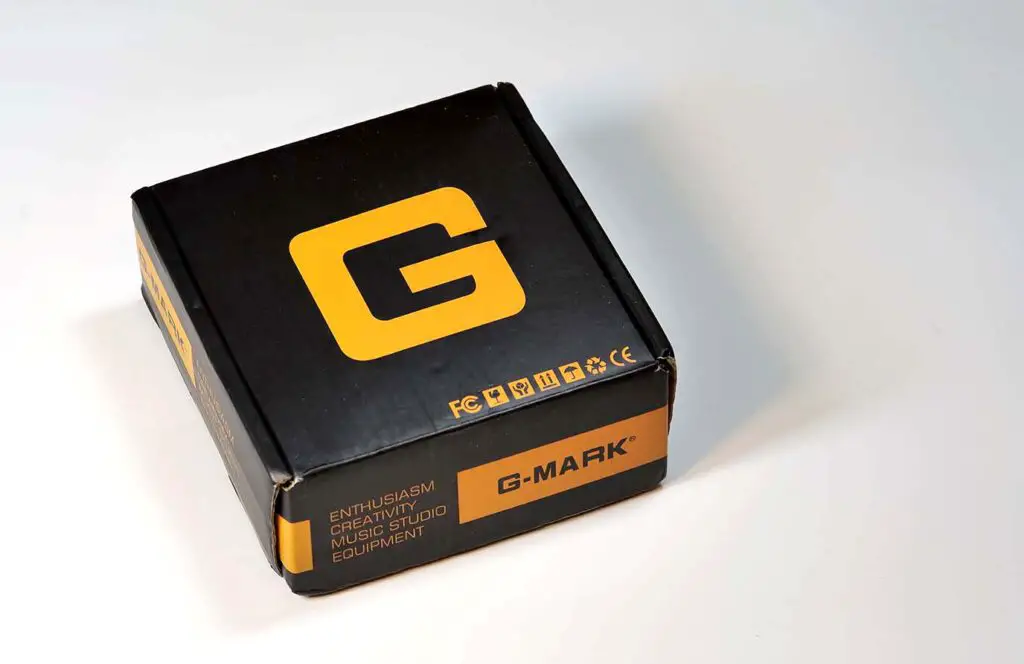
The device branded as “G-MARK MicroAMP EPMH4” that I’ve got here, is a four channel stereo headphone amplifier/splitter, and it is also very clearly a Chinese clone of the pretty well-known Behringer HA400.
Here are the exact specs of the G-MARK EPMH4, taken directly from the instruction manual:
- Input Impedance: 100Ω
- Input Level: +15dBu
- Output Impedance: 80Ω
- Output Volume: approx. 40mW/100Ω
- Power supply: 12V DC, 500mA
- Size: 32mm x 105mm x 58 mm
- Weight: ~0.48lbs / 0.22kg
Without any surprises, it allows you to do exactly the same thing that you could do with a Behringer HA400, and that is, split your chosen single stereo audio output between 4 different stereo channels and amplify each one of them separately with the aid of the built-in gain adjustment knobs.
What’s In The Box?
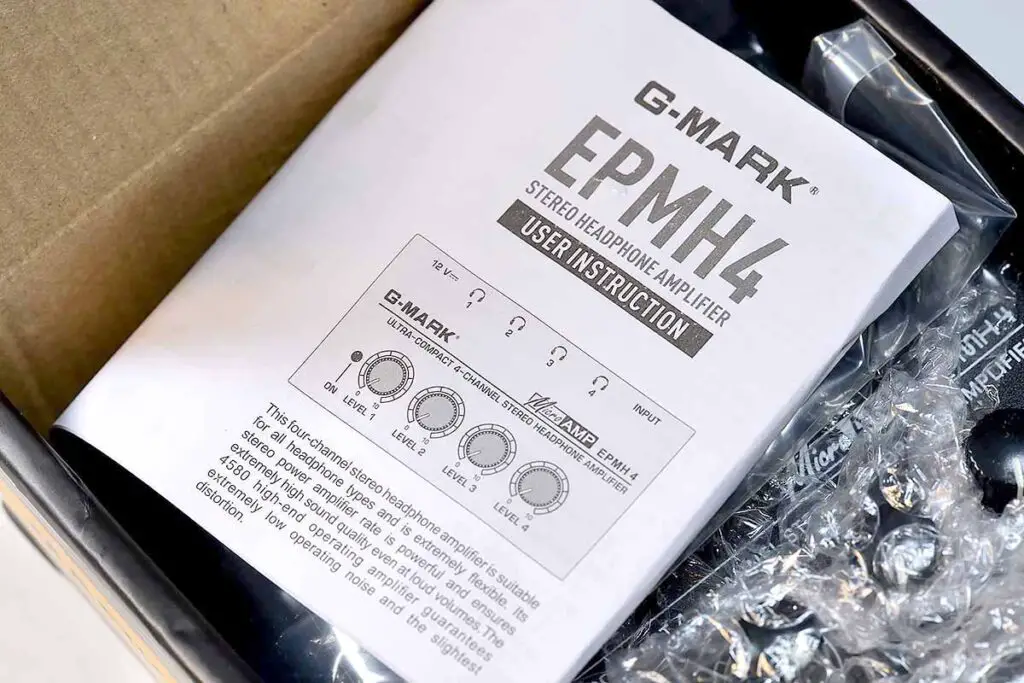
The box presented itself really nicely despite that having purchased a lot of electronics from Aliexpress I was quite honestly expecting to receive a generic no-name package with broken English slogans plastered all over it. This one was a pleasant surprise.
It contained, besides the G-MARK EPMH4 itself, a user manual alongside a compatible power supply which the amplifier requires to function (more on that later). The device was neatly secured inside using bubble wrap – bonus points for that. The instruction manual was rather generic but well-written. All of the specs listed above, were taken straight from it.
The Amplifier/Splitter Itself
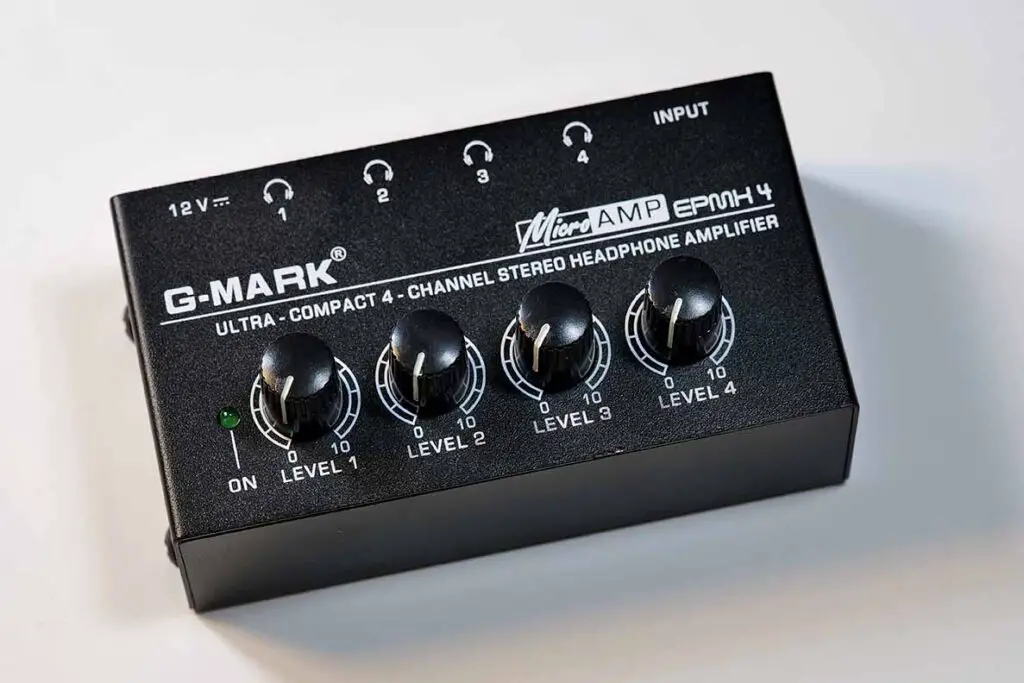
The G-MARK EPMH4 features a full metal casing similarly to the Behringer HA400 which makes it feel quite sturdy and heavy. On the sides, it has 4 screws, which upon removing grant you access to the inside of the device.
There is no power button here, and the amplifier will start working the moment it receives power on the DC input. The power indicator LED light, which you can see on the left side of the gain level knobs is set to be always on.
The Knobs
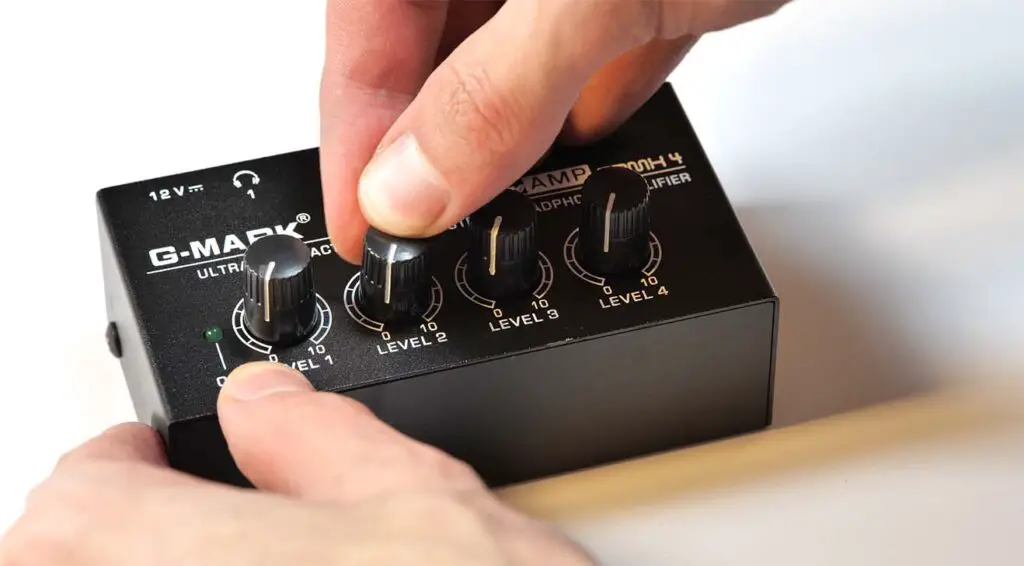
The 4 knobs on the device used to regulate each channel’s gain separately are really tight and satisfying to turn, although if I were to nitpick they do wobble around a little bit when you nudge them left or right.
What matters for me is that just as on the Behringer HA400, they allow for setting your gain precisely, and that they won’t easily move or change their position when you’re moving the device. Once again, quite honestly I wasn’t expecting this quality for a device that often goes on sale for under $12.
Inputs and Outputs & Sound Quality
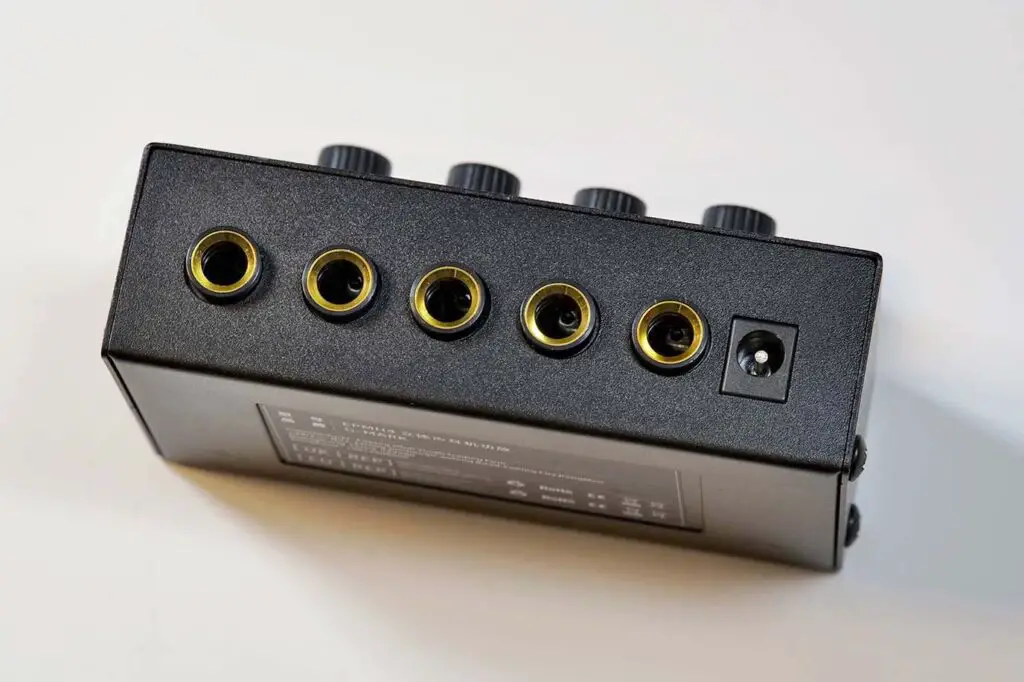
On the back of the G-MARK EPMH4 you can find one large 6.3mm stereo jack audio input, and four 6.3mm audio outputs in the very same format, alongside the 12V power supply input socket.
And here are the most important things that you probably might want to know:
- The device supports stereo input & output just as advertised (keep in mind you have to use stereo audio cables for that).
- It works well with audio adapters and has enough spacing between the back input/output ports to fit even the thickest plugs.
- The sound quality is, at least for me indistinguishable from the Behringer HA400 which I have also used for quite some time.
The only conditions in which I’ve experienced any minimal noise going through the output was when I attempted to use the device plugged into an unearthed power socket and with a cheap off-brand audio input splitter connected to it – that is, in less than sub-optimal conditions.
In my eyes (ears), and in the context of my studio equipment, the quality of the sound passing through the EPMH4 really was indistinguishable from the Behringer HA400.
The Stock Power Supply
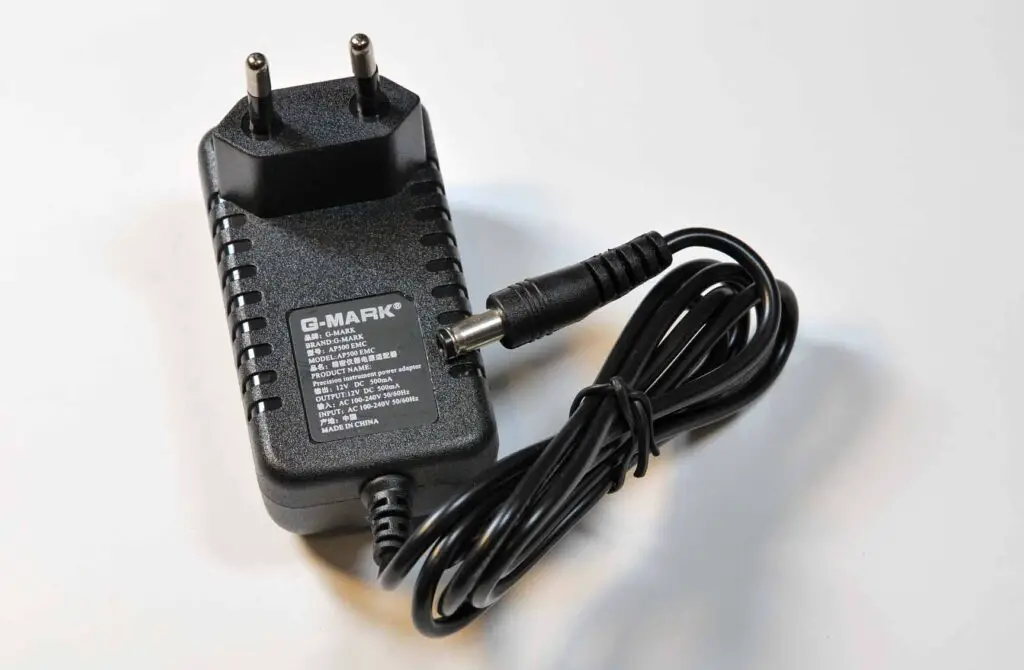
The power adapter that was included in the box is a standard 12V 500mA power supply that is pretty lightweight, but I have been using it alongside the device in my home office setup for a few months now and it seems to be doing its job just fine. In my experience it didn’t get hot, and did not induce any unwanted interference.
Here are the exact specs of this power supply, should you want to try using your own, or need a replacement:
- Brand: G-MARK
- Model: AP500 EMC
- Input: AC 100-240V 50/60Hz
- Output: 12V DC, 500mA
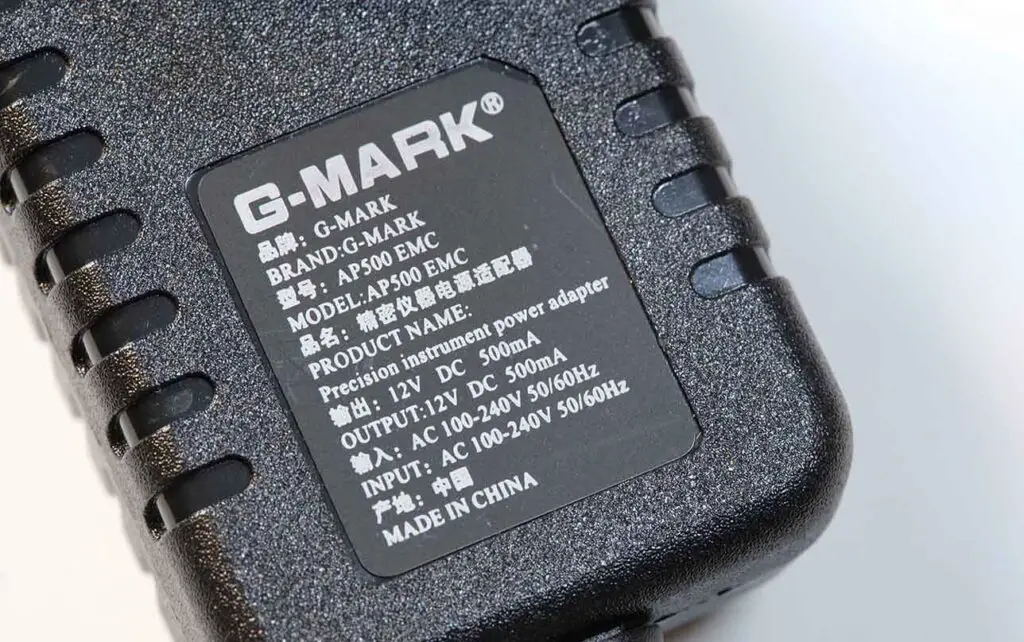
And here is a close up photo of the power adapter specs label, showing its exact listed parameters.
The Conclusion – Is It Really That Good?
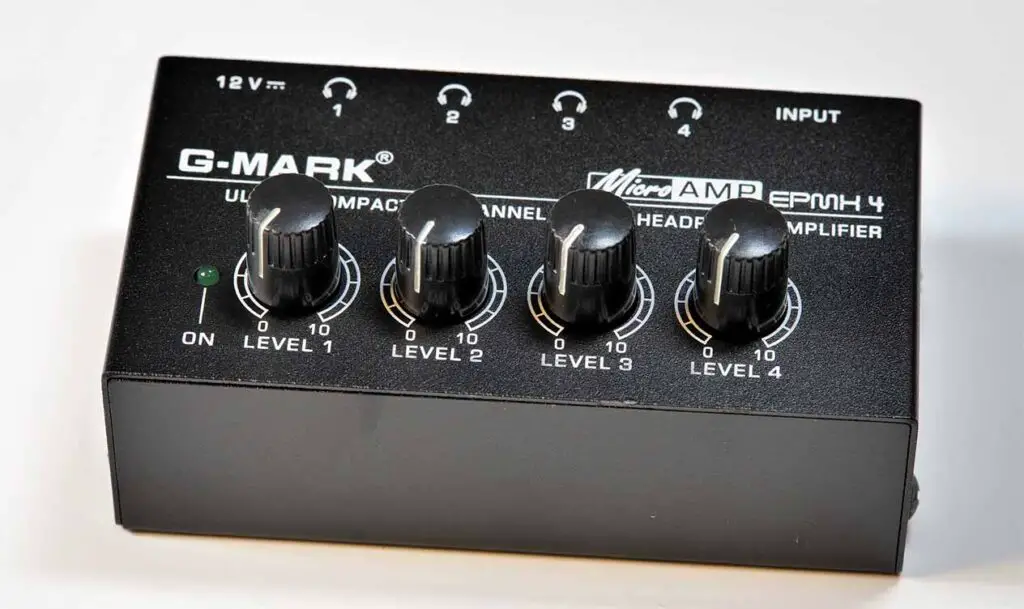
In the end, after using the G-MARK EPMH4 for a few months as a part of my rather over complicated home office audio setup, I’m very pleased to announce that its working well as a replacement for my Behringer HA400, which I have recently found another use for. I haven’t had any issues with the device, or with the stock power adapter it came with, with it being on almost 24/7.
If you’re curious, I actually use it to split the audio coming out from my main PC via the Behringer UMC202HD external audio interface into two pairs of stereo speakers and a subwoofer, as well as zone speakers in my room. There is no audio latency, and the ability to regulate the loudness of each pair of the speakers is really useful!
More Aliexpress Gadgets Incoming
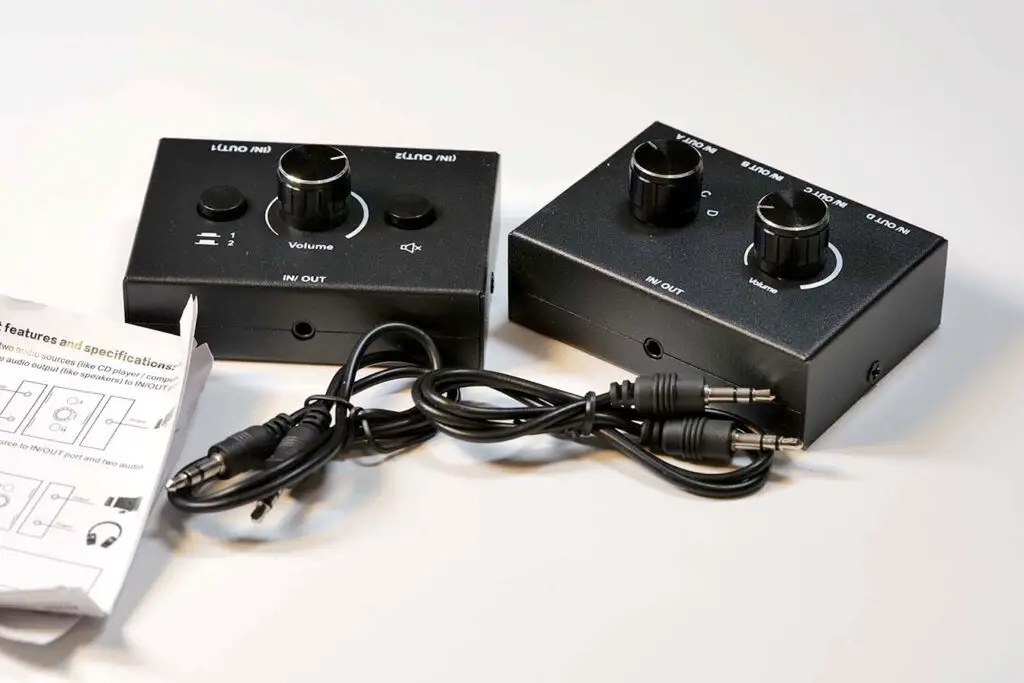
As an avid Chinese gadgets enthusiast I also have some other reviews of odd, cheap and yet still surprisingly useful things you can purchase over on Aliexpress. Check out the rest of my hands-on product review articles, and stay tuned for the new ones if you’re eager for more. Thanks for reading!

